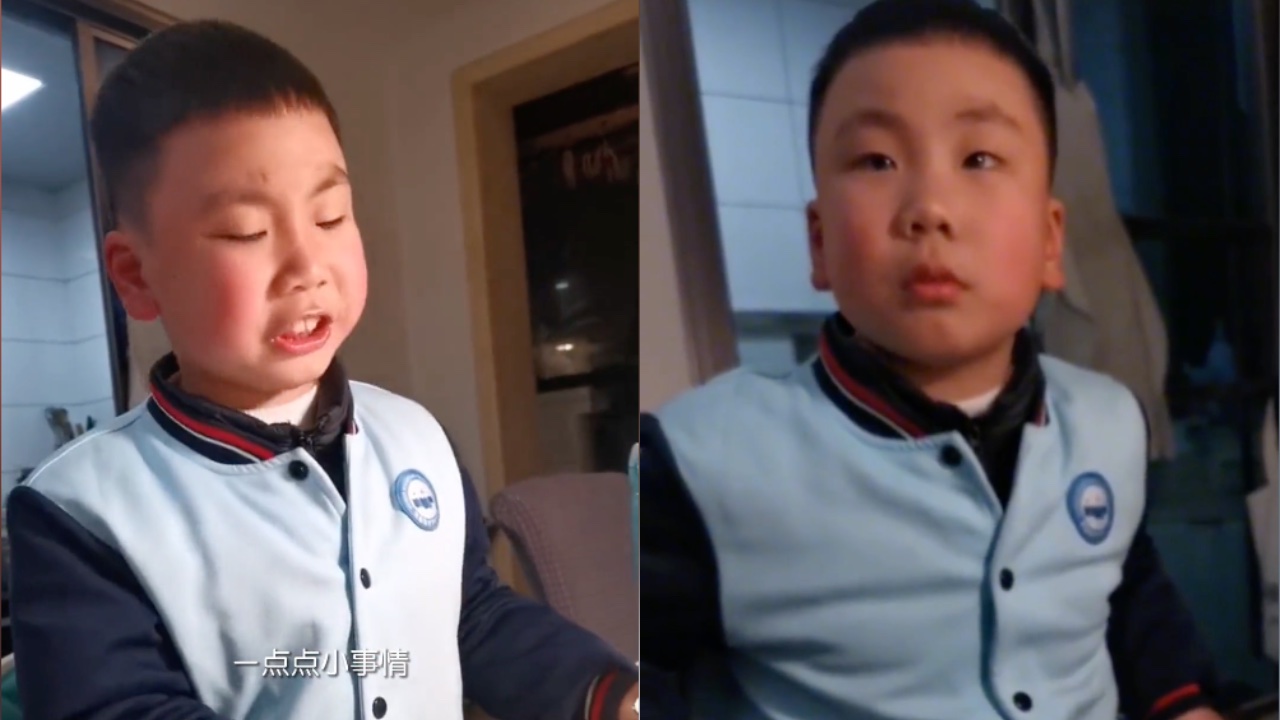Top image: 小宥妈咪 / Douyin screengrab
In a two-minute video that went viral recently, a young boy from China melted the hearts of parents and children alike when he took a vehement stand against his mother’s tiger parenting methods.
The boy, holding a pair of chopsticks in his hand, delivered an eloquent lecture, punctuated with poignant pauses, about his frustrations with his mother. She listens quietly behind the camera, a workbook lying on the dining table.
ADVERTISEMENT
The video was taken and posted on Douyin by his mother, who uses the platform to document videos with and of her son. The original post has now garnered over 78,000 likes and 16,000 comments.
It also blew up in Singapore when Today reposted the video with English subtitles. Comments flooded in, filled with empathy and respect for the boy and his mother.
It must have struck a nerve among Singaporeans. After all, we are no strangers to tiger parents—we’ve either had them or know someone with an intimate experience with them. Maybe some of us might even be tiger parents, whether we know it or not.
In an academically competitive society, they are all too common. They ferry their kids around back-to-back tuition classes and extracurricular lessons. They are often dissatisfied with any grade below ‘A’, and expect children to spend most of their time on their studies. Leisure time? Highly limited, if allowed in the first place.
But to be able to speak out as this boy did is a privilege to many. Facebook user Rachel Rei Chan commented: “If I voiced out like this, I would have gotten pinched, scolded, and yelled at for being ungrateful.”
Others echoed this sentiment. While they would never have gotten the chance to express their feelings like him, they’re glad he did. The outcome of his outburst resulted in a happy ending—in his mother’s next video, she admits her mistakes and promises to change her behaviour.
In exchange, she asks him to promise to better manage his own time and to ensure he has sufficient sleep. Oh, a mother’s heart.
For all the Singaporeans who didn’t get the reconciliation he did, our inner child can only watch on in envy as he manages to say all the things we couldn’t.

Planning for the Ultimate UNO Reverse
The video begins at the climax of his outburst.
ADVERTISEMENT
“When I grow up, when I’m taller than you, what would I do? If I become an astronaut in the future, I’ll teach you a lesson,” he threatened, standing on top of a chair to prove his point.
“I’ll let you feel how strict you were to me when I was growing up.”
Who hasn’t thought about this before? As children, we know that our parents are ultimately still authority figures and that we can’t disobey them. Plus, it’s hard to rebel when you’re yay tall. Whenever we are treated unjustly, we can only simmer in silence, plotting for revenge.
After all, we would never expect our parents to understand. Only after they get a taste of their own medicine, would they possibly see our point of view. I held myself to it, that when I grew up, I would definitely execute my grand plans.
Like the boy in the video, I planned to play the long game. Endure, tolerate and direct all the rage into the war room.
Now that I’m much older, I can barely remember what my grudges were—and thankfully none of my revenge plans went into motion. But at an age when anything you say is retaliation is classified as backtalk, all we wanted was to grow up and be treated like adults.
Turning Empathy Into a weapon
The boy’s next prong of attack was to negotiate with his mother to make his case, using a tiger parent’s most-used weapon: Drawing comparisons.
“When you’re talking to your colleagues, would you be fierce to them? Would you argue with them?” The boy raises his voice as he shoots off a series of rhetorical questions.
He tries to make his mum see through his eyes. He observes his mother having positive social interactions with everybody else, and cannot understand why she cannot do the same for him.
For some of us, the thought of comparison may not be with your parents’ colleagues, but perhaps a cousin, a neighbour’s son or even your friends. Strange, seeing your mother treat your friends better than they do you. It’ll only leave young minds wondering why the same generosity and graciousness cannot be extended to them.
It’s not just about treating others better. Parents also hold their own children to a much higher standard than they do other children.
Of course, all tiger parents want is for their child to achieve excellence. But this means that their achievements are often overlooked, resulting in a perceived injustice. Is it a wonder, then, that children are always crying “Unfair!”?

Tears Are Not a Sign of Weakness
In a string of heartbreaking sentences, the boy finally bares his heart to his mother in what can only be described as a catharsis as the video comes to an end.
“My heart is broken. I don’t want to feel wrong,” he expressed.
“I am not trash. I am not to be treated like an ant. I am not insignificant. I have a brain. I have emotions.”
Hearing these words would break any parent’s heart. Hidden behind the anger, lashing out, and raising of his voice, the only thing that the boy really wanted to communicate was how hurt he felt.
Of course, in the eyes of any Singaporean parent, nagging words are just the way they show concern for their child’s future. Most of the time they do it out of love.
This is clear in the case of the mother and son in the video at least. We can only watch approvingly as he managed to get the happy ending we never did.
Perhaps moved by her son’s impassioned speech (or convinced by the thousands of commenters siding with her son) it’s satisfying to watch his mother compromise and admit fault, a rare sight for children of tiger mums.
The fact that he could even feel safe enough to express all of these things to her perhaps shows that she is not emotionally abusive as many assume her to be.
She is, after all, a mother.






